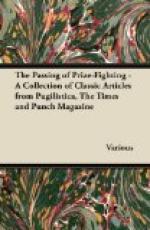The courage of the hero who took up the challenge: “Whoever shall these boots displace, must meet Bombastes face to face,” was comparatively nothing to that of Mr. H.W. FORSTER, who in the interests of economy has promised to limit the height of women’s boots. There will be much stamping of lofty heels at this ukase. Sir JOHN REES thought another order lengthening skirts was the logical corollary, and so it is if the Government really want “to make both ends meet.” But Mr. FORSTER showed no disposition to embark upon petticoat government.
Irish Nationalists worked themselves into seven different kinds of fury over the decision of the Government to apply the rules of arithmetic to the redistribution of seats in their beloved country. Mr. DILLON threatened the House with the possibility that at the next General Election he and his colleagues might be wiped out of existence. Scared by this awful prospect so many Liberals voted against the closure that the Government only escaped defeat by 29.
Thursday, December 6th.—The prospect of an all-night sitting rendered the House unusually irritable. Mr. HEALY fulminated at Sir E. CARSON (who was not present) in language that reminded Colonel SHARMAN-CRAWFORD of “a low police-court.” Mr. DILLON’S high top note was ceaselessly employed in emitting adjectives more remarkable, as Mr. BONAR LAW icily observed, for their strength than for their novelty. At one time it looked as if there was to be a first-class Irish row. But wiser counsels ultimately prevailed. The House as a whole was in no mood for protracted discussion in which non-Irish moonlighters might participate.
At last there is hope that the instructions of the FOOD-CONTROLLER will have some practical result. To-day in reply to a question Mr. CLYNES said, “The order about to be issued will contain provisions ...” Ah! if it only will.
* * * * *
[Illustration: EVIDENCE.
Officer. “NOW, SERGEANT-MAJOR, WHAT MAKES YOU THINK THIS MAN WAS DRUNK?”
Sergeant-Major. “SIR, ON THE NIGHT OF THE 25TH, WHEN I MET THE ACCUSED, ’E RAISED ’IS ’AT, ACCOMPANYING THE MOTION WITH THE WORDS, ‘GOOD EVENIN’, BLUE BEARD!’”]
* * * * *
THE LOST LEADER.
The Hillsbury Company of the 2nd Battalion of the Lastshire Volunteers were being inspected for efficiency by a Captain of the Grenadier Guards, who had graciously come down and devoted his Sunday afternoon to this purpose. Forty “A” men had obeyed their country’s call and turned up on parade, and among the officers was Alfred Herbert, who was a second-lieutenant of the mature age of fifty. He was enthusiastic, but a slow learner, always confusing himself and his men. Still, he was obviously doing his best, and the men forgave him and did their best to cover up his faults.
“Mr. Herbert,” said the inspecting officer sharply, “be good enough to take the company out and move them about for a few minutes.”




